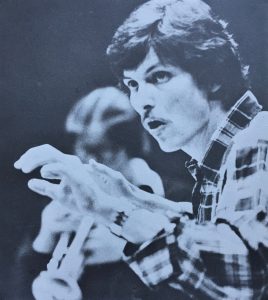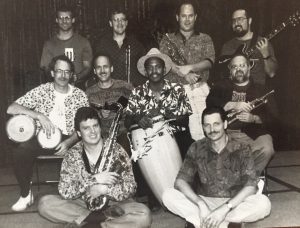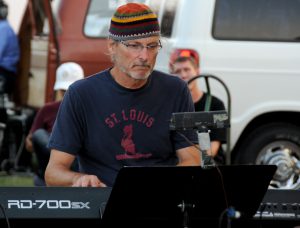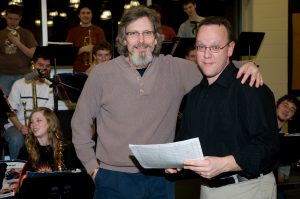Bob Washut Reflects On His Career and Music
By Dennis Green
(This article originally appeared in the newsletter of the Jazz Educators of Iowa)
 In some parallel universe, Dr. Bob Washut is accepting accolades from friends and colleagues as he wraps up a successful career.
In some parallel universe, Dr. Bob Washut is accepting accolades from friends and colleagues as he wraps up a successful career.
As a veterinarian.
And had it not been for a life-changing experience in a high-school honor group, not unlike the All-State Jazz Band he’ll direct this May, our Dr. Washut might also have been a medical doctor. But fortunately for thousands of students and music fans, his life took a different turn.
“I was in the All-State Orchestra as a trumpet player and we played ‘The Pines of Rome,’” he recalls. “And I just got goosebumps. I remember vividly how I was going to be a veterinarian. That’s what my parents were all prepared for. But driving home in the school bus from that all-state experience, that’s when I made the decision to be a musician and primarily a teacher.”
Bob has made his mark as one of the leading teachers, composers, conductors, and performers in the nation. His compositions have been played all over the world. He introduced Iowans to Latin Jazz through Orquesta Alto Maiz. And of course, he has unleashed a generation of outstanding musicians and teachers out into the world
Bob grew up in Sheridan, Wyoming, beginning on piano as a youngster, and taking up the trumpet for band. After his epiphany in the All-State Orchestra, he began his post high-school studies at Casper College. There, an early mentor gave him his first chance to compose.
 “The piece was awful, of course,” Bob says, “but it was a big deal for me at the time and (composing and arranging) really became my primary interest after that.”
“The piece was awful, of course,” Bob says, “but it was a big deal for me at the time and (composing and arranging) really became my primary interest after that.”
He received his Bachelors and Masters degrees from Arizona State, and taught high school briefly before returning to Arizona State as a sabbatical replacement in jazz studies for one of his professors.
Bob says the assignment was particularly challenging because many of his students had been his peers just months before. “I was just staying one step ahead of the students most of the time, and a lot of them were my friends. But after it was all said and done I realized teaching college was really where I wanted to be.”
Which led him to Northern Colorado for his doctorate in Theory and Composition, with a secondary emphasis on Jazz Pedagogy, still a relatively rare area of concentration at the time.
When it was time to search for a permanent position, Bob interviewed for jobs at both UNI and the University of Iowa. He says he liked Iowa City a lot, but thought UNI’s history as a teachers’ college fit with his teaching goals.
Orquesta Alto Maiz, also known as The Salsa Band, came about when Bob received an NEA grant to study with bandleader and composer Clare Fischer, whose Latin arrangements had a harmonic sophistication that appealed to Bob. But the idea of forming a Latin band lay dormant until Bob took UNI’s Jazz Band I to the Montreux Festival in 1985. By chance, he wandered past a stage playing traditional Cuban music, and thought that might be something interesting to try at home.

Orqeusta Alto Maiz in its heyday.
Bob traditionally put together a quartet for Cedar Falls’ annual summer music fest. With salsa and Afro-Cuban rhythms stirring his soul, he tried something new the following summer. He pitched the idea to trumpeter Paul Smoker, then at Coe College, as well as UNI drum alum Dan Hummel and Cedar Falls native Jim Dreier. Other core members of the band, originally known as Orquesta de Jazz y Salsa Alto Maiz(Tall Corn Jazz and Salsa Band), eventually included Steve Grismore, Rich Medd, and Brent Sandy.
But the key was Panama native and UNI alum Ed East.
“He was our connection to authenticity. Originally, it was just instrumental. But I knew Ed could sing, so we started adding some vocal things to the book. And so we put together this set of music to play. I can’t imagine what it sounded like but we sure had fun.”

Bob with the Salsa Band at KCCK’s Jazz Under the Stars in 2012.
Something about the band connected with Iowa audiences, most of whom had never heard anything like it, and soon the Salsa Band was playing clubs and festivals all over the Midwest. A national tour followed, and in 1998, the band was invited to play at Montreux.
“We converted more than a few members of the Latin jazz press,” Bob says with a chuckle, “who couldn’t believe these gringos from Iowa could actually execute the real thing.”
Legendary trumpeter Bobby Shew was so impressed with Bob’s arranging that he invited Washut to contribute material to a Latin album he put out in the late nineties.
The name of the band was eventually shortened to Orquesta Alto Maiz. Most of the original lineup stayed with the band for more than twenty-five years, before Washut and some of the other long-time members retired in 2012. The band continues today under the leadership of Ed East.

Bob and Iowa City West Director Rich Medd when Bob was one of the first guest artists for KCCK’s Corridor Jazz Project in 2008
Bob’s most recent recording project has been “Journey to Knowhere,” that he recorded in Colorado, where former student Mike Conrad is studying for his doctorate. Bob assembled a true all-star band for the project, recruiting Conrad, his UNI colleague Chris Merz, as well as some of today’s most noted players. The list includes Bobby Shew, Greg Gisbert, Pete Olstad, Paul McKee, John Gunther, Peter Sommers, Wil Swindler, Dana Landry, Erik Applegate, and Jim White for the project. Washut is donating proceeds from album sales to UNI scholarships.
Bob’s “farewell tour” begins in Cedar Falls and concludes in Des Moines. On April 28, many former students returned to UNI to honor Bob and perform under his baton one more time for a concert entitled “Washut Swan Song.”
Then he heads to the Iowa Bandmasters Association Conference on May 10, where he’ll direct the 3A All-State Jazz Band, the exact kind of program that originally inspired him to turn from veterinary medicine to music.
And who knows? Perhaps a student pondering his or her post-high school career will be inspired to become a teacher just as Bob was.
